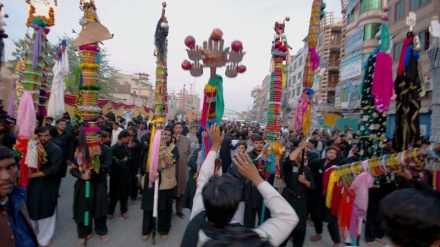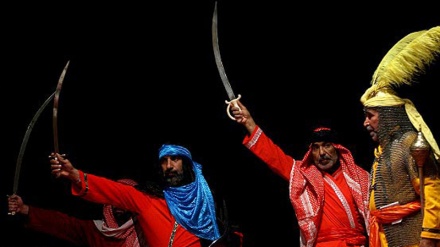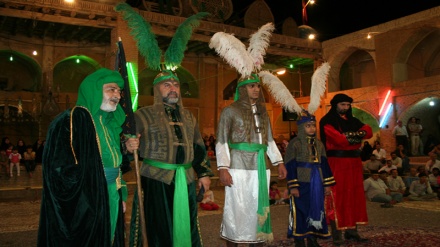Muharram mourning traditions in different lands - 25
Welcome to the 25th part of the 40-plus episodes of a new and interesting series titled “Muharram Mourning Traditions in Different Lands” that we started broadcasting as of October 15 on a daily basis, to commemorate the heartrending tragedy of Karbala, and the martyrdom of Imam Husain (PBUH), the grandson of Prophet Mohammad (Blessings of God upon him and his progeny).
In this series, which delves into the various mourning traditions associated with the Immortal Epic of Ashura in various lands, we look at the history of mourning for Imam Husain (PBUH) in Algeria and North Africa.
In Algeria, which was once part of the Fatemid Shi’a Muslim dynasty that originated in what is now Tunisia and later shifted its capital to Egypt, where it founded the city of Cairo, the people wear black clothing not only during Muharram but until the Arba’een or the 20th of the next month of Safar, that is forty days after the martyrdom of Imam Husain (AS). They offer special prayers in mosque and attend religious gatherings. There are a number of religious activities and events.
People attend sermons in the public halls; and recitation of the holy Qur’an. They also organize religious meetings and recite elegies in memory of the Martyrs of Karbala, but they do not take out processions the streets, or beat their chests in public to express grief, as is the custom in countries having sizeable population of Shi’a Muslims. It is worth noting that Algerian Muslims, including many Sunnis, do not hold fun gatherings or conduct marriages during this period of time.
Presently, according to official figures, Shi’a Muslims make up only two percent of the national population in Algeria. Most of them live in the western part of Algeria. Some are the native Algerian Shi’a Muslims, while the rest have recently embraced the School of the Ahl al-Bayt of Prophet Mohammad (SAWA).
Western Algeria was part of the Morocco-based Empire of Idris I, a great-grandson of Imam Hasan Mojtaba (AS), the elder grandson of Prophet Mohammad (SAWA). Idris ibn Abdullah, who founded his rule in 788 and died three years later, bequeathing the kingdom to his posthumous son, the famous conqueror Idris II, had come to Maghreb or the far west of the Islamic realm, after the Battle of Fakhkh, near Mecca, where the Abbasid usurpers, massacred many male descendants of the Prophet.
The powerful Awraba Berbers of Volubilis (or Walili as the Berbers called it) took him in and acknowledged him as their Imam. The Awraba tribe was originally from the Tlemcen region and had supported Kusayla in his struggle against the Omayyad armies in the 670s and 680, roughly corresponding to the tragedy of Karbala. The Idrisid Empire, which followed the teachings of the Prophet’s Ahl al-Bayt and was known as Shi’a Muslim, lasted for two centuries till 794, when it declined due to the rise of another Shi’a Muslim dynasty in North Africa, the powerful Fatemids, who initially established their rule in the Kutama society of Algeria under Abdullah al-Mahdi Billah.
Today many people in Western Algeria and parts of Morocco have been observed as taking an interest in Shi’a Islam, although their ancestors were forcibly converted to Sunnism. Nevertheless, they have preserved much of the traditions of their ancestors, including the rites and rituals of the mourning month of Muharram. They consider the Muharram as the sacred month because it marks the sacrifice of the grandson of the Holy Prophet.
The events commemorated by the Shi’a Muslim in Algeria are:
Ashura or 10th of Muharram.
Arba’een or the 40th day following the martyrdom of Imam Husain (AS)
The Birthday of Prophet Mohammad (SAWA)
The Birthday of Imam Mahdi (may God hasten his reappearance for establishment of the global government of peace, prosperity and justice)
Eid al-Ghadeer, or the 18th of Zi’l-Hijjah, the day the Prophet on divine commandment proclaimed his cousin and son-in-law, Imam Ali ibn Abi Taleb (AS), as vicegerent.
The people of Algeria are very interested in the Ahl al-Bayt or blessed household of the Prophet, and particularly in the multi-facet personality of Imam Ali (AS). That is the reason why most of the boys are named, “Seyyed Ali,” in parts of Algeria. The tenth of Muharram is also a public holiday in most parts of Algeria on account of the tragedy of Ashura, and the martyrdom of Imam Husain (AS) in Karbala. There are many streets and quarters in Algeria where you will find the place for mourning such as Husseiniyah. The religious speakers are devoted to the Ahl al-Bayt, and hence hold mourning ceremonies in their own peculiar ways in Algeria.
AS/ME


